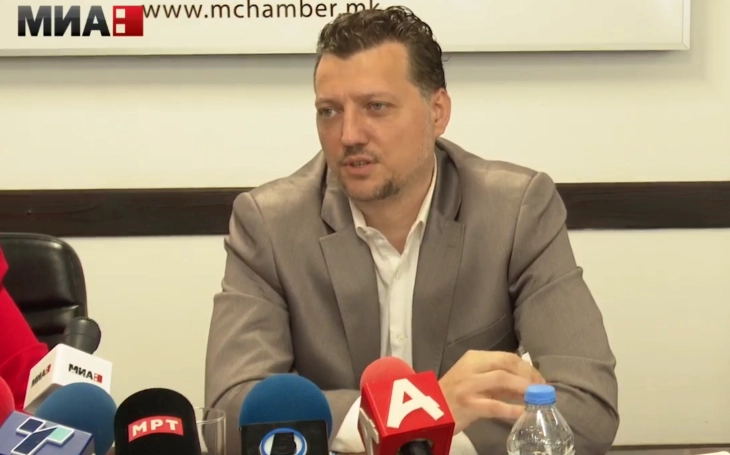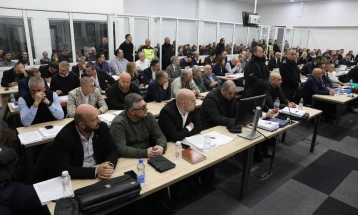Economic Chamber calls for inter-regional cooperation to promote benefits from Growth Plan
- Fully functional green corridors at all border crossings that connect the region with EU can reduce border wait time by three hours, which is similar to reducing border procedures by two percent in all economies, according to analysis by the Economic Chamber of North Macedonia, published Wednesday.
- Post By Nevenka Nikolik
- 15:01, 12 June, 2024

Skopje, 12 June 2024 (MIA) - Fully functional green corridors at all border crossings that connect the region with EU can reduce border wait time by three hours, which is similar to reducing border procedures by two percent in all economies, according to analysis by the Economic Chamber of North Macedonia, published Wednesday.
Inter-regional import of the six countries in the region makes up 14 percent, and a larger trade exchange is just one of the benefits of the Growth Plan, which, according to the Chamber, is important for boosting regional cooperation, and removing trade exchange barriers.
Chamber spokesperson Vlatko Stojanovski said the obstacles for greater exchange are non-tariff barriers, such as border and security certificates, phytosanitary certificates, etc.
"We need to work on that. We constantly identify and highlight them as obstacles to regional trade exchange," Stojanovski said at the press conference for the Growth Plan and projects of the Chamber's investment forum.
Due to a lack of a legal basis by EU countries for trading data with non-member countries, green corridors are being placed on key border crossings that connect the region. Therefore, new Growth Plan measures foresee complete exchange of data that will significantly reduce border wait time, as well as mutual recognition of authority of economic operators.
"The benefits for our companies will be huge. In 2023 alone, border wait time significantly reduced due to the already established inter-regional green regions. Fully functional green corridors at all border crossings that connect the region with EU will reduce border wait time by three hours, which would mean a 2 percent reduction in all economies in border procedures. Additionally, green corridors will facilitate continuous operation of supply chains, increase trade, and make the region more appealing to investors," Stojanovsi highlighted.
The Chamber notes that the need for reducing the economic convergence gap is more than obvious. European Commission reports on the economies of the Western Balkans are not at the level of a market economy that can deal with the pressure that comes from the EU.
"Despite the closeness and other favorable factors for encouraging trade, inter-regional export in the region remains at just 14 percent. EU is still a dominant export market for the Western Balkans, which for many countries in the region export to EU is five times larger than export to CEFTA countries," Stojanovski said.
The country's largest trade partner for inter-regional export is Serbia, then Bosnia and Herzegovina, and Albania. Economies from the Western Balkans mostly trade with EU countries, which makes their export five times larger than the one with Central European Free Trade Agreement (CEFTA) countries. Hence, inter-regional cooperation through the action plan for single regional market must be encouraged.
"Administrative and customs procedures, safety requirements and certificates, sanitary and phytosanitary measures, and technical trade barriers are highlighted as the main trade barriers in foreign exchange. The European Commission announced that it is necessary to adopt active measures for concluding mutual agreements for removing such barriers, and introduce the 'CE Mark' for European certificate of conformity in order to align with EU standards for product quality," Stojanovski noted.
The business sector at the Chamber Investment Forum (CIF) was consulted on the priority areas that need to be improves for accelerated access to EU, and received a mandate to work on drafting a new action plan for a single regional market, which will be the basis for promoting regional cooperation.

Chamber spokesperson Sonja Nikolova presented CIF's new project, supported by EU and the Economic Chamber of North Macedonia that offers support to companies in the region in several aspects. One of its main goals is increasing competitiveness by creating a single regional market by reducing economic differences and encouraging closer economic ties between business communities, above all, in the region, and EU.
"The goal is for this region to have easier access to the European and other markets. The closer companies from the region get and build on their inter-regional cooperation, the easier it will be for them to perform on the European market," Nikolova said.
The Western Balkans 6 Chamber Investment Forum (WB6 CIF) is a joint initiative of the Economic Chambers of Albania, Bosnia and Herzegovina, Kosovo, North Macedonia, and Montenegro, and represents more than 300,000 companies with the aim of connecting the business community in the region and to facilitate inter-business contacts. ssh/nn/
Photo: print screen







